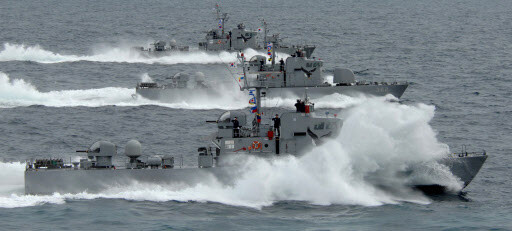hankyoreh
Links to other country sites 다른 나라 사이트 링크
South Korea deviated from previous rules of engagement in West Sea clash

The South Korean navy enacted different rules of engagement during the exchange of fire between the North Korean and South Korea naval ships on Nov. 10 in comparison with the two previous inter-Korean naval battles that occurred in the West Sea in 1999 and 2002 (also known as the Yeongpyeong Naval Battle of June 1999 that lasted 9 minutes and Second Yeongpyeong Naval Battle that lasted 24 minutes).
In the previous two battles, the South Korean navy had implemented rules of engagement with five procedural steps of “announcing a warning, moving, firing a warning shot, firing a threatening shot, and firing a precision shot.” The previous rules of engagement were designed to avoid battles between the North Korean and South Korea navies.
In contrast on Tuesday, the South Korean patrol boat issued a warning shot immediately after moving and communicated a warning message. In response, the North Korean vessel took a precision shot and in turn, South Korea took a precision shot. Since 2004, when the rules of engagement were set, three to six warning shots have been exchanged per year, and these shots are the first that have taken place this year. Observers suggest the new rules of engagement curtail steps that could prevent clashes from escalating.
The two Koreas have been arguing over the West Sea waters ever since the United Nations forces established the Northern Limit Line (NLL) above the five West Sea islands in 1953 after the Korean War. North Korea presented a maritime demarcation line in 1999 that announced that the NLL was invalid.
Observers are saying this incident was made possible in an atmosphere in which the South Korean navy feels no resolve to avoid battles with the North Korean navy. In response to the South Korean government’s announcement made earlier in the year about its decision to fully participate in the U.S.-led Proliferation Security Initiative (PSI), North Korea had said it could no longer guarantee the safe passage of U.S. and South Korean naval ships or civilian shipping vessels in neighboring waters. In response, Chung Ok-geun, then-Chief of naval operations ordered naval soldiers not to avoid battle and said, “If the enemy hurts one of our fingers, we should respond by cutting its wrist.”
Please direct questions or comments to [englishhani@hani.co.kr]
Editorial・opinion
![[Column] Season 2 of special prosecutor probe may be coming to Korea soon [Column] Season 2 of special prosecutor probe may be coming to Korea soon](https://flexible.img.hani.co.kr/flexible/normal/500/300/imgdb/original/2024/0426/3317141030699447.jpg) [Column] Season 2 of special prosecutor probe may be coming to Korea soon
[Column] Season 2 of special prosecutor probe may be coming to Korea soon![[Column] Park Geun-hye déjà vu in Yoon Suk-yeol [Column] Park Geun-hye déjà vu in Yoon Suk-yeol](https://flexible.img.hani.co.kr/flexible/normal/500/300/imgdb/original/2024/0424/651713945113788.jpg) [Column] Park Geun-hye déjà vu in Yoon Suk-yeol
[Column] Park Geun-hye déjà vu in Yoon Suk-yeol- [Editorial] New weight of N. Korea’s nuclear threats makes dialogue all the more urgent
- [Guest essay] The real reason Korea’s new right wants to dub Rhee a founding father
- [Column] ‘Choson’: Is it time we start referring to N. Korea in its own terms?
- [Editorial] Japan’s rewriting of history with Korea has gone too far
- [Column] The president’s questionable capacity for dialogue
- [Column] Are chaebol firms just pizza pies for families to divvy up as they please?
- [Column] Has Korea, too, crossed the Rubicon on China?
- [Correspondent’s column] In Japan’s alliance with US, echoes of its past alliances with UK
Most viewed articles
- 1Samsung subcontractor worker commits suicide from work stress
- 2‘We must say no’: Seoul defense chief on Korean, USFK involvement in hypothetical Taiwan crisis
- 3[Editorial] Korea’s surprise Q1 growth requires objective assessment, not blind fanfare
- 4Division commander ordered troops to enter raging flood waters before Marine died, survivor says
- 5Is Japan about to snatch control of Line messenger from Korea’s Naver?
- 6No good, very bad game for Korea puts it out of Olympics for first time since 1988
- 7US overtakes China as Korea’s top export market, prompting trade sanction jitters
- 8N. Korean delegation’s trip to Iran shows how Pyongyang is leveraging ties with Moscow
- 9Korea’s 1.3% growth in Q1 signals ‘textbook’ return to growth, says government
- 10[Column] Season 2 of special prosecutor probe may be coming to Korea soon